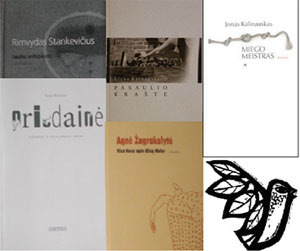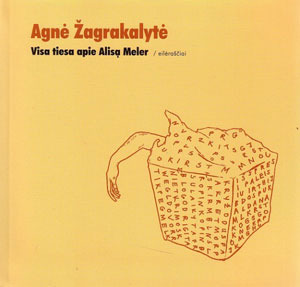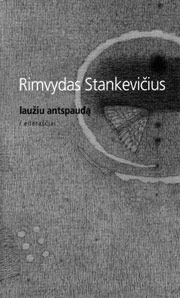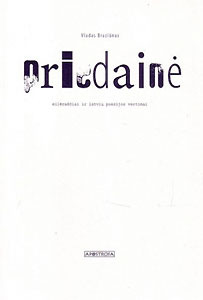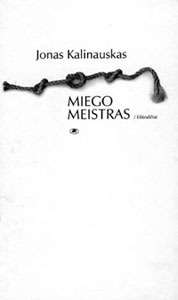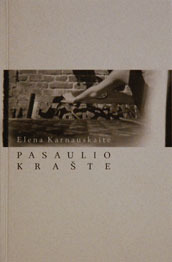ABOUT POETRY OF CANDIDATES TO LAURELS OF “POETRY SPRING ‘09”A: OPENLY AND ATTENTIVELY 0
AKLAS Žirklionis
www.kamane.lt, 2009 07 31
In brief: The literature youth of Vilnius University, Kaunas Humanitarian Faculty calling itself Žirklionis, the active literature movement of alternative direction, maturing openly under the wing of www.kamane.lt, discusses the poetry books of all candidates to the laurels of “Poetry Spring ‘09”. The following members participated in the discussion: Mindaugas (leader of discussion), Eglė, Loreta and Lina. Their shortened statements are presented in the summary of the discussion.
Mindaugas: Even though the “Poetry Spring’09“ (PP’09) came and passed, it is worth coming back to it once again. This year the candidates to the prize were Agnė Žagrakalytė for the selection “All Truth about Alice Meller”, Rimvydas Stankevičius (“I Break the Seal”), Vladas Braziūnas (“Refrain“), Jonas Kalinauskas (“Master of Sleep“) and Elena Karnauskaitė (“At the Edge of the World“). An interesting fact is that these books were among the top ten books that were the most creative in 2008. Perhaps the organisers of the Poetry Spring selected all poetry books from the list and compiled their own list? Therefore, it is worth getting sure that these five books were really irreproachable.
After starting to read the selection of Agnė Žagrakalytė “All Truth about Alice Meller”, I noticed that the contradiction of daily life and poetry is typical of her poems. An impression is created that daily life is privileged in her poetry. The poetess used many slang words, which de-poetise the entire poems.
Eglė: I was charmed by unexpected turns of thoughts in this selection.
Loreta: I found too much of daily life in the book. The accidental but conscious usage of daily details becomes boring in many poems.
Mindaugas: Let us now turn attention to Rimvydas Stankevičius and his “I Break the Seal”. I would attribute the work of Stankevičiaus to a completely different manner of speaking than poems of A.Žagrakalytė. His language renders very strong belief in the power of word. R.Stankevičius may be attributed to tradition which makes one believe that the word may take one “to another side”, that it is possible to erase the border between experience and language. Still, didn’t the poet start considering himself two important in the context of contemporary poetry?
Loreta: Sometimes I find poets whose works sound in my heart. Such are the poems of R.Stankevičius and V.Braziūnas. The poems of R.Stankevičius are lively, rhythmical, strong, pushing and easy to read. I am attracted by the poet’s attention to experiences, his sensitivity and his courage to think even about unpleasant things.
Eglė: For me “I Break the Seal” was as strong as the poet’s earlier selections by the meaningfulness and the subtle manner of feeling the environment typical of the poet.
Lina: I have to admit that every poem of R.Stankevičius may be enjoyed, they are all like open books telling about something and giving or taking something.
Mindaugas: What about “Refrain“ by V.Braziūnas? R.Stankevičius does not doubt possibilities of a word; meanwhile, “Refrain” seems to reconcile with the fact that the word may not turn into body and that the body may not turn into word. It seems that V. Braziūnas has reconciled with the thought that poetry is not that mystical sound of “the other side” or “eternity”.
Loreta: The poems of V.Braziūnas left a pleasant impression on me. The game based on associations while travelling from line to line, variety of themes, unusual forms of poems locked by attention.
Lina: Strange as it is, I want to compare poetry of V.Braziūnas with two things: poetry of S.Geda and fishing. The return of the poetry to the roots, opening to nature, its archaic features and majesty, the language, metaphors, oppositions somehow create these associations.
Mindaugas: What about fishing in waters of "Master of Sleep” of J.Kalinauskas? I was not a successful fisher again. The feeling that creation comes from loneliness is very strong in J.Kalinauskas’ book; still, the loneliness is not overcome. There is too much frustration in his poems. I found this selection acceptable for the laconic, concentrated language, surrealistic logic. The poems are short but the experience is very concentrated. Still, hopelessness in every line of a poem makes all poems sound the same.
Lina: The impression after reading the book that it does not differ from earlier works of J.Kalinauskas. Also, I agree with Mindaugas about the monotony of emotions and experiences.
Mindaugas: Lina has mentioned that the poems of E.Karnauskaitė are very emotional, but the spectrum of feelings is rather narrow. E.Karnauskaitė seems to state sadly that romantic language has nothing new to say. I believe, "At the Edge of the World” could be attributed to the context of romantic lyrics. Attempts are made to rise above the daily banality, to reveal existential tension, speak about loneliness.
Loreta: In fact, there are many big and small experiences in her poems. The poems are simple to read, still, they do not catch your attention and do not stay in the head too long.
Lina: “At the Edge of the World” is emotionally strong but it lacks something.
Eglė: I will be frank – E.Karnauskaitė is not interesting to me. There is no authenticity in her poems, and it is hard to search for some talent expression artificially.
Mindaugas: Thus, let us decide whether R.Stankevičius was really the most worth to receive the crown of laurels of the Poetry Spring’09.
Loreta: I believe, he was the most worth from these candidates.
Lina: R.Stankevičius is worth the prize, but I would have granted two awards: one to R.Stankevičius and another to V.Braziūnas.
Eglė: R.Stankevičius is worth the crown in the context of PP, no doubt. Meanwhile, speaking about the wider context of Lithuanian poetry, discussions could arise.
